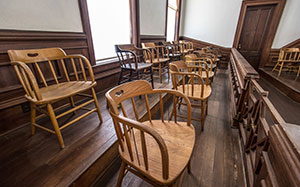When it comes to the criminal justice system, the importance of jury selection cannot be overstated. For defendants in Tarrant County, having a fair and impartial jury can significantly impact the outcome of a case. Recently, Dallas Cowboys kicker Brandon Aubrey made headlines for serving as a juror in a felony family violence trial, bringing attention to the jury selection process and its vital role in our legal system.
In this blog post, we’ll delve deeper into the jury selection process, explore its implications for criminal cases, and discuss the invaluable role of a Tarrant County criminal defense attorney in navigating these complex waters.


The Jury Selection Process: A Closer Look
1. Jury Summons & Panel Assembly
In Tarrant County, the jury selection process begins with the issuance of jury summonses. Individuals from various backgrounds receive these summonses, compelling them to report to court. The goal is to assemble a diverse panel of potential jurors, typically around 70 people. This diversity is crucial for ensuring that the jury represents the community as a whole, fostering a sense of fairness and legitimacy in the trial process.
2. The Questioning Phase
Once the panel is assembled, the questioning phase begins. Both the prosecution and defense attorneys take turns asking questions to assess the jurors’ backgrounds, beliefs, and attitudes. This phase is essential for uncovering any biases or preconceived notions that potential jurors may hold. Questions may cover topics such as personal experiences with the legal system, opinions on law enforcement, and views about the specific charges in the case.
Attorneys must be skilled in crafting questions that not only reveal bias but also gauge the jurors’ ability to remain impartial. For example, an attorney might ask a juror about their feelings regarding certain types of crimes, which can provide insight into whether they may hold biases that could influence their judgment.
3. For Cause Strikes
If a juror expresses strong opinions or demonstrates bias during questioning, either side can request a “for cause” strike. This means they ask the judge to dismiss that juror based on their inability to serve impartially. For example, if a juror reveals a personal experience that might color their perspective on a domestic violence case, this could be grounds for a for cause strike. The judge will then evaluate the situation and determine whether to excuse the juror, helping to ensure that only fair-minded individuals serve on the jury.
The importance of this process cannot be overstated; a juror with a biased perspective can significantly sway the outcome of a trial. By carefully evaluating each potential juror, both sides work to create a jury that can fairly evaluate the evidence presented.
4. Peremptory Strikes
In addition to for cause strikes, each side is granted a limited number of peremptory strikes—usually 10. These allow attorneys to remove jurors without needing to provide a specific reason, as long as the decision isn’t based on race or gender. This gives both the prosecution and defense the flexibility to shape a jury that they believe will be more favorable to their case.
Attorneys often use their peremptory strikes strategically, choosing to remove jurors whose backgrounds or attitudes might not align with their legal strategy. For example, if a juror has a strong anti-defendant sentiment, even if not explicitly stated, the defense might choose to strike that juror to maintain a more sympathetic panel.
5. Final Selection Of The Jury
Once the questioning and striking process is complete, the remaining jurors form the final jury panel, typically consisting of 12 individuals. These jurors will be tasked with evaluating the evidence presented during the trial and rendering a verdict based on the facts of the case. The dynamics of the jury can be influenced by various factors, including group interactions and the personalities of the jurors, making this final selection phase critical.
The Impact Of Jury Selection On Criminal Cases
The selection of a jury is not just a procedural formality; it can significantly influence the outcome of a trial. In Tarrant County, where the legal landscape is complex and nuanced, having a skilled criminal defense attorney is essential. They understand the intricacies of jury selection and can effectively advocate for a fair process.
The Role Of A Criminal Defense Attorney


Assess Potential Jurors: They will evaluate potential jurors based on their responses during questioning, identifying any who may be biased or unfavorable to their client. This assessment is crucial for building a strong defense strategy.
Utilize Strikes Wisely: By strategically using for cause and peremptory strikes, attorneys can craft a jury that is more likely to be sympathetic to their defense. This can be particularly important in cases where emotions run high, such as those involving family violence or other sensitive issues.
Prepare For Trial: Understanding the jury pool allows attorneys to tailor their strategies for presenting evidence and arguments that resonate with jurors. They may adjust their approach based on the demographics and attitudes of the jurors, ensuring that their defense is both compelling and relatable.
Understanding The Implications Of Jury Decisions
The jury’s decision is not merely a reflection of the evidence presented; it is also shaped by the jurors’ beliefs, backgrounds, and experiences. An experienced criminal defense attorney understands this and uses their insights to create a defense that addresses the potential biases and concerns of the jury. For instance, they may present evidence in a manner that is relatable to the jurors’ experiences or frame arguments that appeal to their values.
Conclusion
Brandon Aubrey’s recent experience as a juror highlights the importance of civic duty and the complexities of the jury selection process. For defendants in Tarrant County, having an experienced criminal defense attorney by your side can make all the difference in navigating this critical phase of a trial.
If you or someone you know is facing criminal charges, don’t hesitate to reach out to a Tarrant County criminal defense attorney. They can guide you through every step of the legal process, ensuring your rights are protected and you receive a fair trial.
For top rated legal assistance in Tarrant County, contact Medlin Law Firm today at (682) 204-4066 or visit our website www.MedlinFirm.com. Let us help you secure the best possible outcome for your case. Remember, a well-informed jury is crucial, and having the right legal support can make all the difference.
Similar Posts by The Author:
Publicaciones Similares del Autor:
(682) 204-4066 We cannot receive pictures via text so please send those via email or hand deliver to our office.





